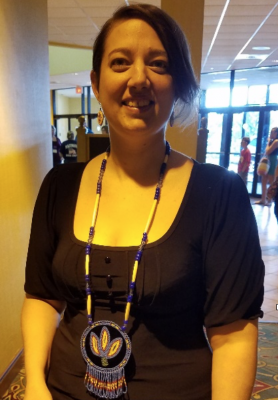
Photo provided by Holly Helton-Anishinaabeqwa.
Rising Voices: Please tell us about yourself.
Greetings, my name is Holly Helton-Anishinaabeqwa, descendant of St. Croix Band of Lake Superior Chippewa from Wisconsin, United States of America, and a member of the Marten clan. My mother is an enrolled member of Lac Courte Oreilles Band of Lake Superior Chippewa. As an indigenous youth growing up, I was never taught my language, due to the acts of assimilation and threat of boarding schools in my great-grandmother’s day. Today, my family is trying to revitalize the use of Anishinaabe in our household.
My Anishinaabe name is “Ogichidaakwe”, which means “Woman Who Speaks for the People”. I currently work for the Global Indigenous Languages Caucus to help Indigenous communities to preserve/revitalize their languages by setting up language programs. I’m currently learning my language Anishinaabe, as well as teaching my two sons. I’m a graduate of UW-Milwaukee with a bachelor’s degree in Anthropology with an emphasis on International relations and Indigenous Issues and working towards completing a master’s degree.
RV: What is the current status of your language on the internet and offline?
The current status of the Anishinaabe language online can be found on YouTube, Instagram, Apps, and other social media sites as well the Anishinaabe people have been working hard to integrate our language into more modern forms of communication. Online dictionaries and tools for learning Anishinaabe can be found online in the United States and in Canada. Our people have truly connected with the online community to help educate others as well as own people. The growth of online use of the Anishinaabe language has grown over the years to teach, advocate, and preserve our language for future generations.
Ojibwe People's Dictionary project:
https://ojibwe.lib.umn.edu/main-entry/ogichidaakwe-na [4]
Anishinaabe can be found offline in such books as Weweni by Margaret Noodin [5] (Poetry written in Anishinaabe/English) to children’s books such as Yea! Gimiwan! An English/Ojibwe Counting Book by Michael Lyons. Bilingual books are becoming more common and Indigenous authors are honoring their heritage by writing Indigenous stories in the original language. Also, immersion schools are now being formed to help grown new fluent speakers. What is truly inspiring are the colleges in the United States, such as UW-Milwaukee that offer Anishinaabe as part of their language department, which students can learn about the language and the cultural.
Waadookodading (Anishinaabe Immersion School):
RV: On what topics do you plan to focus during the week that you’ll manage the @NativeLangsTech Twitter account?
I plan to focus on creating a language nest in my home to help grow my children into fluent speakers and hoping to encourage other families to do the same. Indigenous languages have always had a place as the mother tongue of Indigenous families and to help revitalize that is important and can help Indigenous people who might be far from their communities to hold on to the language and given them support that others are doing the same.
RV: What are the main motivations for your digital activism for your language? What are your hopes and dreams for your language?
My main motivation for my digital activism for my language is to one day hear the Anishinaabe language in every format, television, radio, books, and schools. Indigenous languages should be given equal status to the other major languages and should be made available to all Anishinaabe.